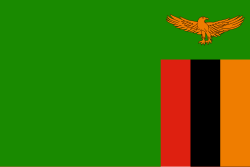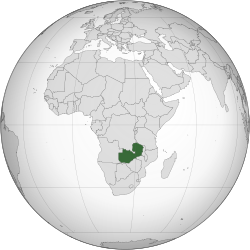Republic of Zambia | |
|---|---|
| Capital and largest city | Lusaka 15°25′S28°17′E / 15.417°S 28.283°E |
| Official languages | English |
| Religion | Christianity (State religion) |
| Demonym | Zambian |
| Currency | Zambian kwacha (ZMW) |
| Time zone | CAT |
| ISO 3166 code | ZM |
This is a select bibliography of English-language books (including translations) and journal articles about the history of Zambia. Book entries have references to journal reviews about them when helpful and available. Additional bibliographies can be found in many of the book-length works listed below. See the historiography section for several additional historiographic information from academic publishers and online bibliographies from historical associations and academic institutions.
Contents
- About
- Inclusion criteria
- Citation style
- General works about Zambian history
- Archeology and prehistory
- Pre-colonial era
- Colonial Rhodesia era
- Independent Zambia
- Foreign relations
- Ethnic groups and tribes
- Topical works
- Agriculture
- Business and economics
- Colonialism and decolonisation
- Comservation and the environment
- Education and children
- Entertainment and leisure
- Food security
- Gender and sexuality
- Health
- Human rights
- Journalism and media
- Labor
- Legal and judicial
- Linguistics and language
- Literature
- Military
- Mining and industry
- Nationalism
- Religion, beliefs, and traditions
- Slavery and forced labor
- Rural life
- Urban life
- Miscellaneous
- Biographies
- Books with significant material about Zambian history
- Historiography and bibliographies
- Primary sources
- Reference works
- Libraries
- Academic journals
- See also
- References
- Notes
- Citations
- External links
Zambia, [a] officially the Republic of Zambia, [b] is a landlocked country at the crossroads of Central, Southern and East Africa. [c] The territory of Zambia was known as Northern Rhodesia from 1911 to 1964. It was renamed Zambia in October 1964 on its independence from British rule. The name Zambia derives from the Zambezi River (Zambezi means "the grand river"). [1] [2]



